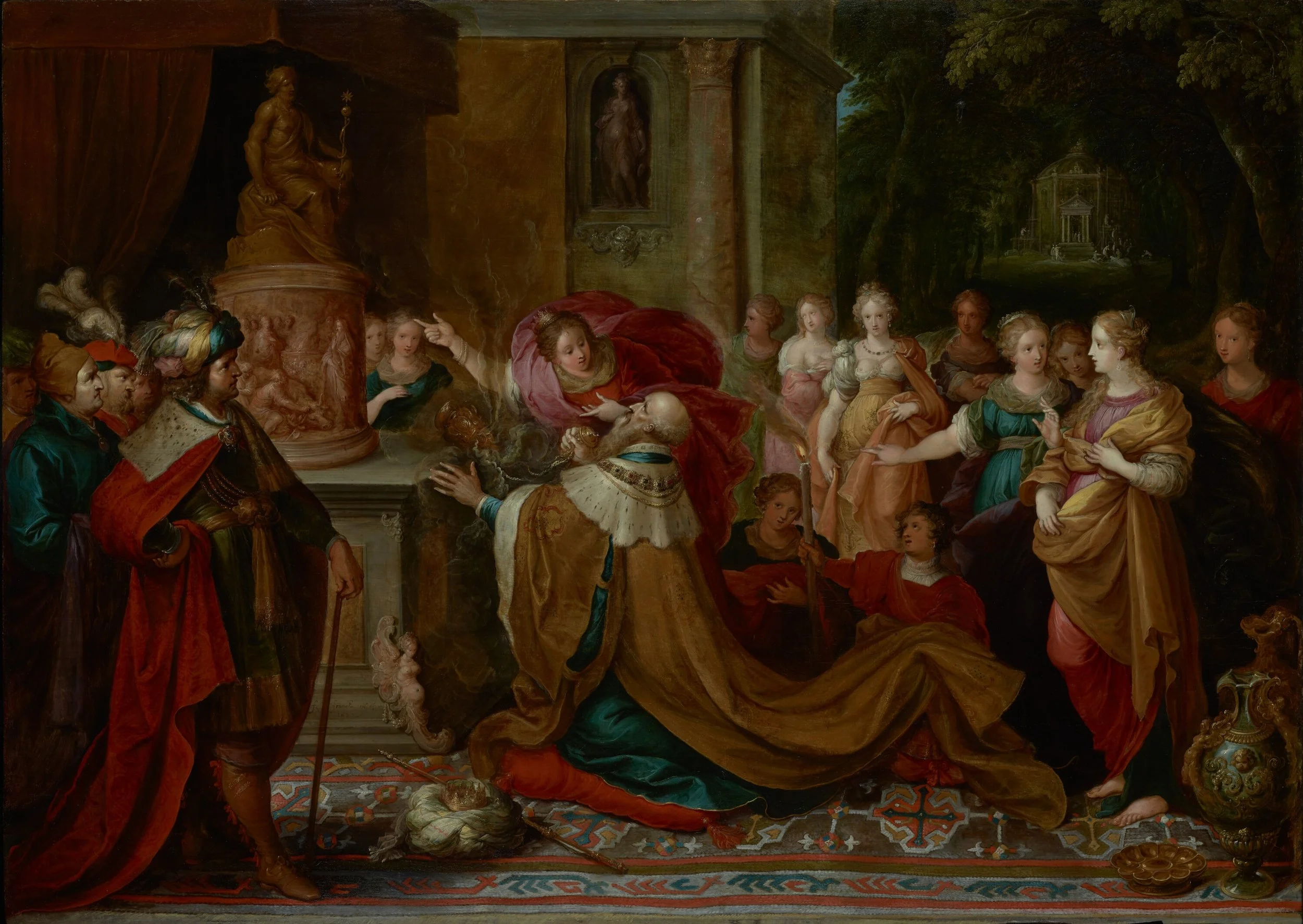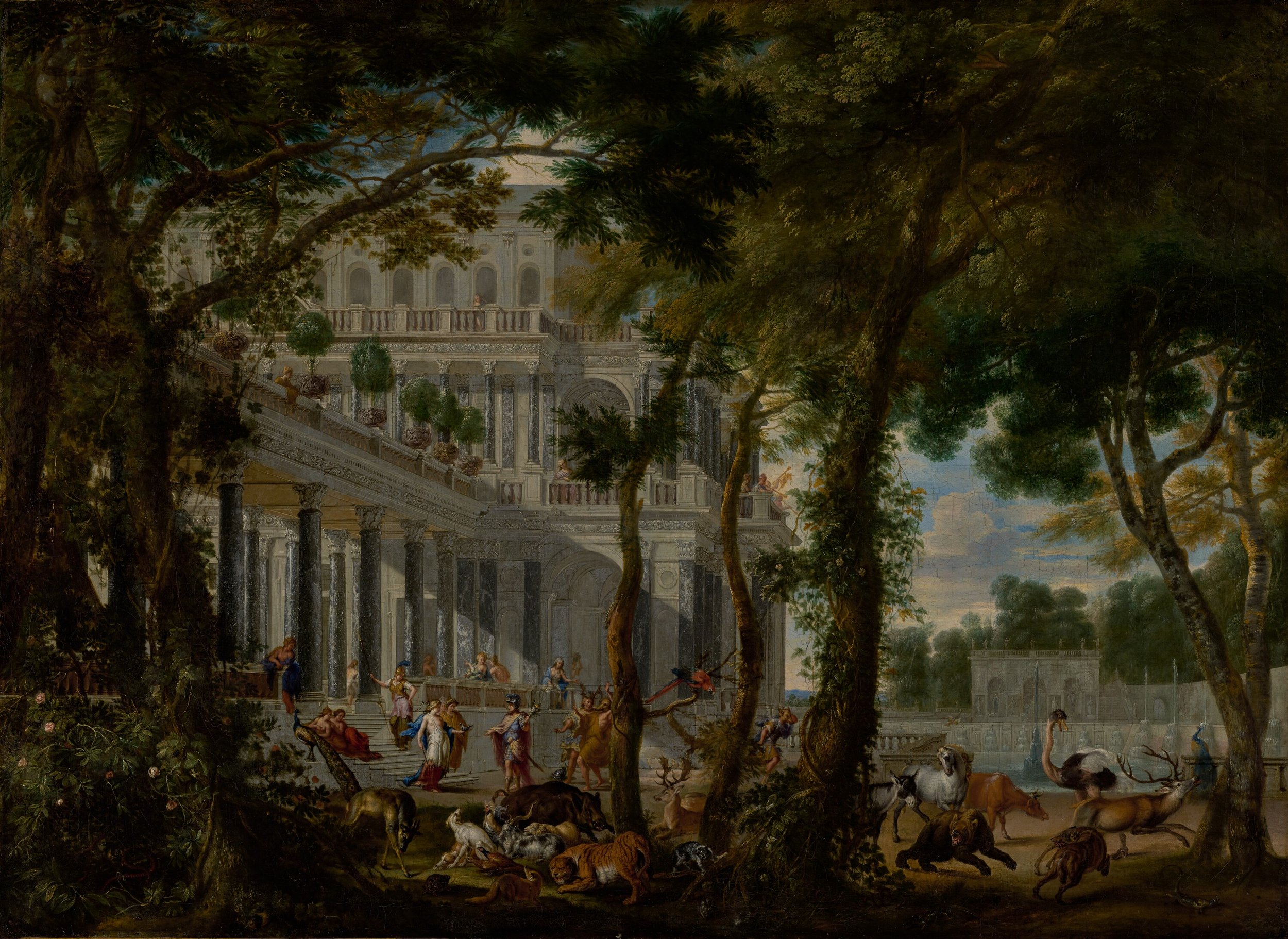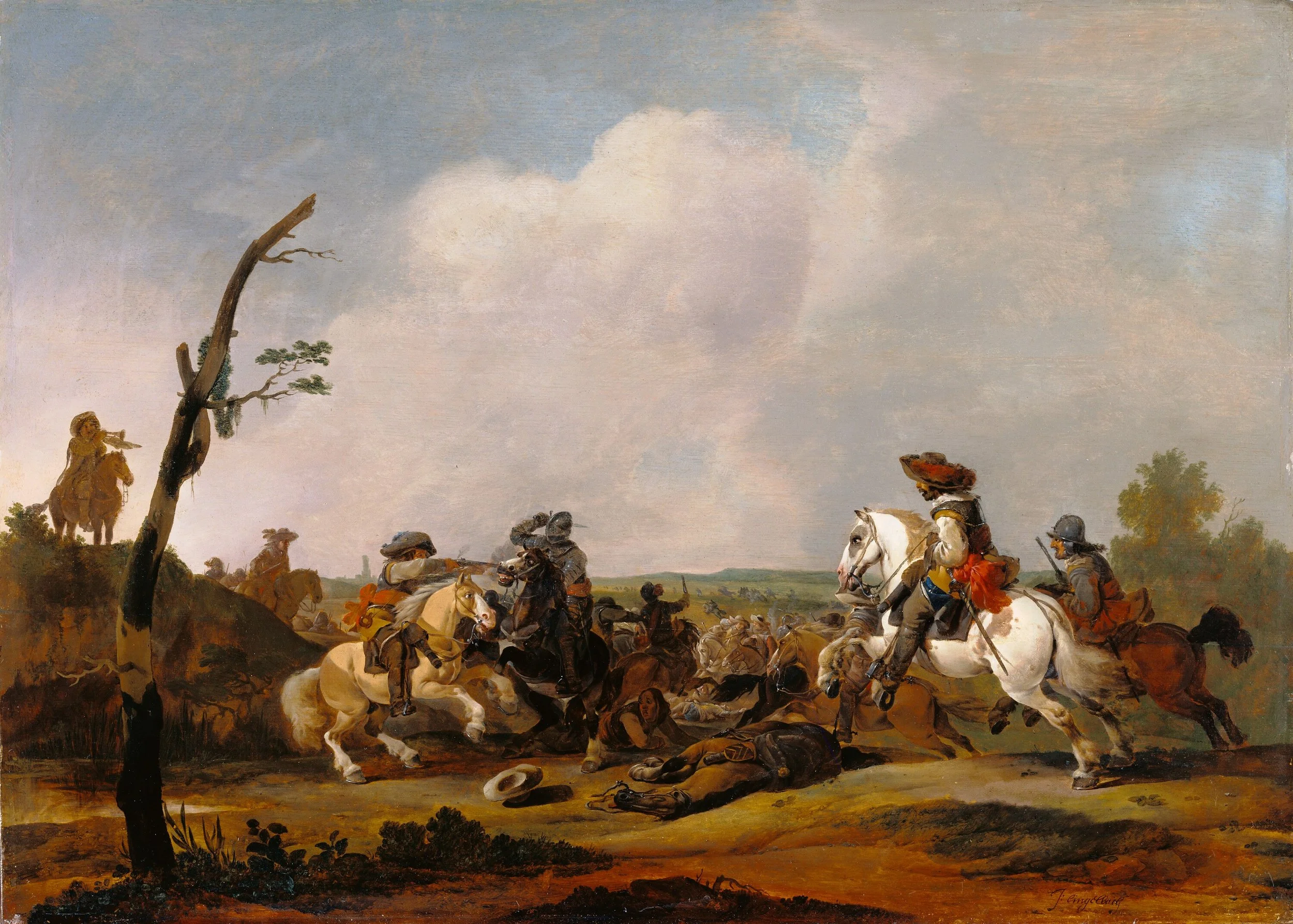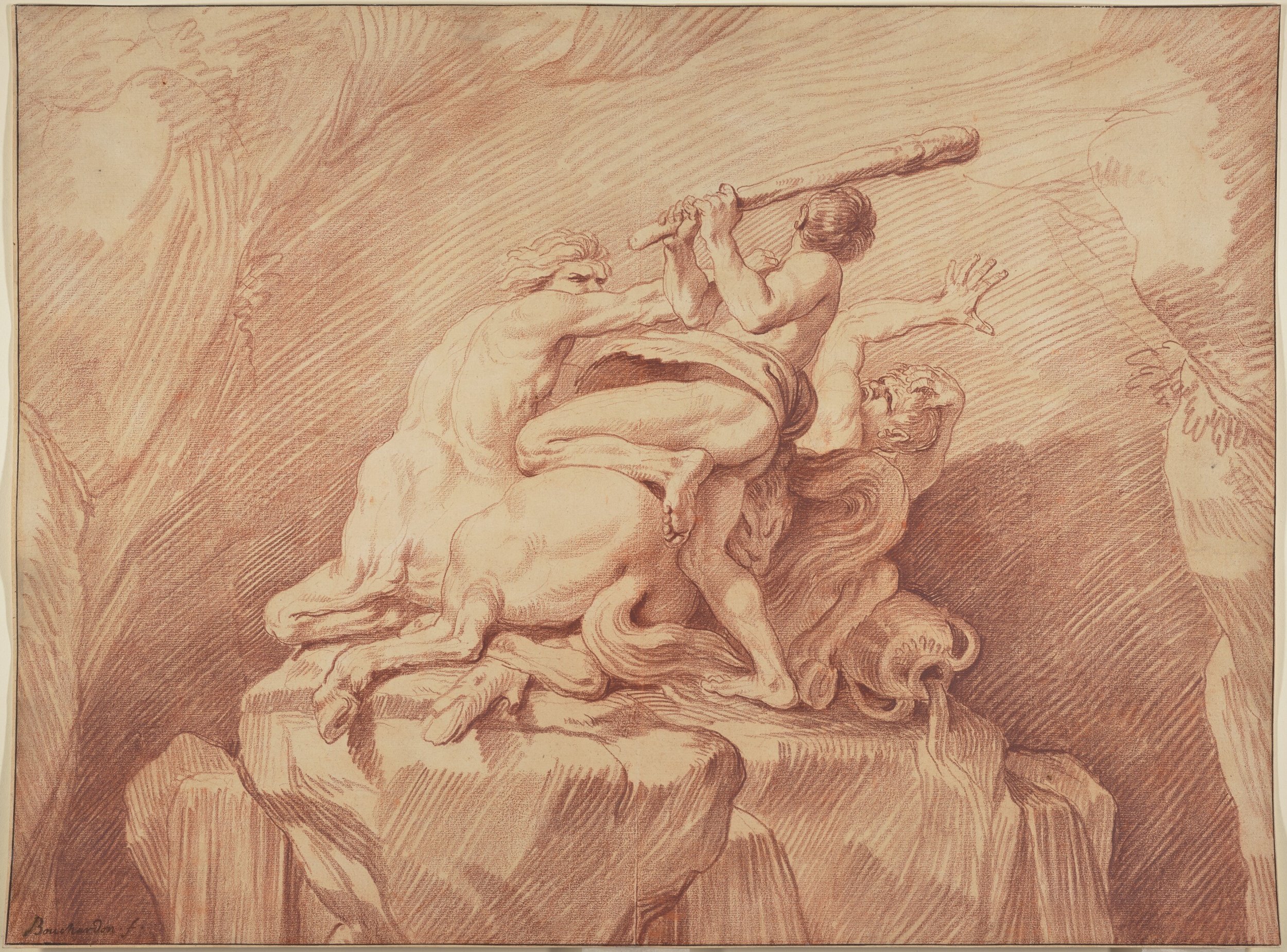The Boethius Project
Consolation of Philosophy, IV
If there’s an all-powerful God, and this ruler of the universe is also the source of all love, then why is it that so often bad things seem to happen to good people? How do the wicked get ahead? Ah, Philosophy explains, it’s not that simple, for the wicked are their own punishment.
The Death of Socrates by Jacques Louis David from The Met Museum
-
Confronting the question of evil
Boethius has an objection. If there is no such thing as evil, as Philosophy has just said, then how does he see so many evil things in the word? “Even though there is a ruler of the universe who is good, there is nonetheless evil in the world, even evil that passes unpunished,” he says.
Boethius saw plenty of evil and vice flourish during his life in the Roman courts. He pursued virtue and service but is now suffering under the injustice of slanderous rumors and an impending brutal execution. And today, we too can point to countless examples of horrible violence, greed, and cruelty in the world.
But Lady Philosophy stands firm. Evil doesn’t exist. It is not from lack of empathy or understanding of Boethius’s situation. She is aware that her wisdom and teachings years before inspired him to enter the public arena. She knows he learned from Plato the need for virtuous people in public service to sow into the community at large. Yet Plato himself also saw the potential costs of doing so when he witnessed the unjust death of his mentor, Socrates. It has never been easy for virtue to enter the public sphere. It has never been without risk to the messengers who carry it.
Lady Philosophy’s response is simple. “Vices are never unpunished and virtue is never unrewarded.”
She sees that Boethius is ready to move to this greater and more demanding discussion. That he has regained the tools and footing he had lost in his despair. And it is in confronting these difficult questions that he will truly be consoled and strengthened to face what lies before him.
The Chariot of Apollo by Odilon Redon from The Met Museum
-
Making the Ascent to God
Lady Philosophy encourages Boethius to engage difficult questions like evil, but to do so with care and intention. She “has wings with which you can fly, ascending as an exaltation of larks to Heaven.” And she likens this ascent to surpassing the path of even Phoebus Apollo, soaring instead to the “king of kings” himself.
The cautionary tale of Phaethon warns of the danger of making such an ascent recklessly. When Phaethon tried to take on the role of Phoebus Apollo, his godly father, and reach beyond his limit, the consequences were disastrous. He wrought ruin on the earth and was himself destroyed.
But, if Boethius continues his ascent under the guidance of Philosophy, he can avoid such a fate. Because we are called to make such an ascent. We are called to lift our minds, hearts, and souls to the “king of kings”, to God, and to one day return home to heaven.
Lady Philosophy explains that once Boethius has successfully completed this contemplation, he’ll look back at all those still beholden to things of this world and “see them all as exiles.” This theme of exile comes up repeatedly in the Bible, often reminding the people of God to not grow attached to this world for they are made for something more. The Old Testament prophets warned that focusing on the fleeting goods of this world would distract from living as God’s people. As St. Paul writes to the Hebrews, all the generations since Abraham came to “confess themselves sojourners and guests upon earth.”
And Lady Philosophy’s exhortation to Boethius to let go of earthly preoccupations and to rise above them, mirrors the same exhortation made by St. Peter in his first letter. There, he calls on the new believers to turn from the malice, deceitfulness, and falseness of the world to the virtues of God. He begs them “as new arrivals and sojourners, to abstain from carnal desires, which battle against the soul.”
For Boethius, and us, to discover the comfort and rest found only in God, we must make this ascent. But we must do so carefully. It involves grappling with the foundational principles that undergird the entire universe and taking the leap of faith to trust in God when reason reaches its limit. But Lady Philosophy has laid the bedrock for such endeavors. And so, we begin the climb.
Koppelpoort te Amersfoort bij maanlicht by Christiaan Wilhelmus Moorrees from the Rijksmuseum
-
The weakness of the wicked.
In response to Boethius’s concern that wicked men not only get ahead but even seem unpunished, Lady Philosophy delves into the weakness of these wicked men with a powerful, yet simple, example. What is more effective: walking on your feet or walking on your hands?
Boethius agrees that when trying to reach any destination, walking on our feet is easier, more effective, and more aligned with our natural abilities than walking on our hands. So too, the pursuit of happiness is easiest, most effective, and most aligned with our natural calling when pursued via the virtues. “The highest good, which is available to both the good and the wicked, the good try to get by the exercise of their virtues. But the wicked try to get it by the whims of their desires—which is not at all the natural way to obtain the good.”
The good man, she explains, directs his desire for the good and happiness by cultivating and exercising virtue. While a wicked man mistakenly pursues his desires as the path for happiness. He confuses getting exactly what he thinks he wants with getting what he needs. And because it is a false road, he ends up empty. The only way to truly achieve the good and to reach happiness is through virtue. Through the natural course to rise above our base desires and to reach our calling.
Lady Philosophy emphasizes that the wicked are trapped by their own weakness. Their inability to resist their desires and to strive for more prevents them from obtaining true happiness. They lack the self-control needed to order the desire for the false goods towards the ultimate good. And because of this, they are weak. While the virtuous man has shown the strength of will and character to order his desires toward a much greater end.
The Idolatry of Solomon by Frans Francken the Younger from the Getty Museum
-
Ruled by Desire.
The weakness of the wicked lies in their slavery to their desires. “The kings are overthrown: the rulers are ruled by these masters.”
Lady Philosophy has used the image of a king several times to emphasize the disparity between appearances and reality. In book 3 prose 5, Lady Philosophy referenced the sword of Damocles, where a king helps a servant understand the tenuous nature of power by giving the servant all he could possibly want and more, then hanging a sword precariously above his head. Having the appearance of great power does not bring security, but only greater trepidation of losing it all.
Accumulating a great deal of any false good (wealth, honor, pleasure, power, or fame) brings not security or strength, but paranoia and fear. Just as they can be hoarded and collected, they can be stolen and taken away.
If we base our happiness on these unstable foundations, we’ll find that happiness can also be stolen. We’ll keep needing more and more to satisfy because these false goods aren’t what we truly need. But our pursuit of them can become all consuming until we are ruled by our desires, instead of ruling our desires.
Ulysses at the Palace of Circe by William Schubert van Ehrenberg, with animals by Carl Borromäus Andreas Ruthart from the Getty Museum
-
The true nature of the wicked.
If we are made to rise to the good, then when we turn from the good and choose wicked, we turn from our true nature. Lady Philosophy explains that “all those who have put goodness aside have no right to be called men anymore, since there is nothing divine about them, but they have descended to the level of beasts.”
When we choose to be wicked, we yield the very essence of our humanity. We surrender our call to goodness and to divinity. Instead, we choose to become bestial. This theme is shown by authors throughout the ages.
In Homer’s Odyssey, Circe transforms Odysseus’s crew into beasts until he negotiates with her to return them to their true form.
Dante’s Inferno is full of souls he encounters who either have bestial qualities, like the thieves transformed to serpents, or are reduced to a bestial state like the gluttons.
Marie de France plays with the idea to show how appearances can be deceiving in Bisclaveret. A knight transforms into a werewolf, but retains his nobility and honor, eventually regaining his human form. While his duplicitous wife reveals her true wicked heart and is disfigured.
As Lady Philosophy explains, the wicked are their own worst enemy. They choose to turn against their nature and to turn from the good. And even if they appear to get ahead, they must still face the distortion within. And therein lies their punishment.
Plate 135: Circe Changing Ulysses’ Men into Swine (Ulyssis soci a Circe in porcos), Ovid’s ‘Metamorphoses’ by Antonio Tempesta from the Met Museum
-
What proceeds from the heart.
Lady Philosophy delves into the disparity between the appearance of wicked men and their interior state. While in the eyes of the world, these people may appear to get ahead or to have success. But, she argues, by forfeiting virtue and turning from the good, they have distorted their soul.
Under Circe’s enchantment, Odysseus’s crew were transformed bodily and “only their minds persisted to recognize their disaster and grieve at their dreadful fate.” Circe couldn’t change the innate nature of the men, just the appearance. Thus Odysseus was able to bargain with the sorceress and she could return them to their prior state.
Lady Philosophy warns that the worst poisons are those which “creep within and infect the mind and soul, while they leave the outer shell untouched.” In this, she echoes Jesus’ anger in Matthew 15 at the hypocrisy of the scribes and Pharisees. He warns that “a man is not defiled by what enters into the mouth, but by what proceeds from the mouth” for “what proceeds from the mouth, goes forth from the heart.”
We are called to live in integrity. Our actions and appearance are meant to be aligned and oriented toward the good. But if our hearts are aligned toward vice instead, we cannot live in integrity. Therefore, we must intentionally cultivate a life of virtue. So that what proceeds from the heart brings us closer to our ultimate goal of happiness.
Man Seated in Prison by Victor Jean Nicolle from the Met Museum
-
Redirecting the hearts of the wicked.
The wicked seem to get ahead but are in reality only submitting to their base desires, like beasts. But Boethius objects that it would be much better if they didn’t have the power to act on their base desires at all.
Lady Philosophy once again surprises him by asserting that the wicked don’t actually have any power. She argues that “in the short span of a man’s life, nothing is so far off as to seem long to wait for.” All the machinations, scheming, and planning of the wicked to achieve their misguided desires will fail. It may seem to take a long time to us, but in the span and scope of eternity, it takes no time at all.
The wicked set themselves up for the failure by relying not on virtue, but the fickleness of their own desires. What they have created is a life full of restlessness, unease, and emptiness. They have sought to satisfy the deepest longings of their souls with false goods.
Because of this, “the wicked are actually happier being punished than they would be if there were no retribution to restrain them.” Deep within, they are made for more. They are called to more. And, even if they don’t realize it, the punishments which restrict them from fulfilling their base desires draw them closer to their true calling and redirect their hearts towards the good.
The Calydonian Boar Hunt by Peter Paul Rubens from The Getty Museum
-
Our own worst enemy.
When the wicked indulge in vices, they harm themselves. Through their deeds, they orchestrate their own demise. As Lady Philosophy reminds Boethius again and again, death is already “on its way of her own accord, drawn by her flying horses.”
Our time here is finite and brief. We have a limited opportunity to live our lives well. That’s why each decision and action matters. As Aristotle explains in his Nicomachean Ethics, we grow in virtue over the course of our lives through repeatedly choosing virtue. That’s how it becomes a habit. And every decision either builds towards that or moves away.
When the wicked choose vice consistently, they lay the traps for themselves. Lady Philosophy points out there are plenty of dangers in life already. “Men are the prey of serpents, lions, tigers, bears, and boars” so why create our own downfall through bad choices? That is the fate the wicked create. And that is why she insists that we “love the good and pity the wicked.”
God the Father by Ambrogio Bevilacqua from the Met Museum
-
A good plan.
Boethius objects that while ultimately there are punishments for the wicked, it doesn’t change the fact that so often it seems the wicked are rewarded and the good are the ones punished. In a world ruled by chance, this would make sense. But in a world ruled by a good and just God, this shouldn’t be possible.
Lady Philosophy assures him that when “the true causes of something are not understood, it can appear to be random and confused.” We are limited in what we understand about the workings of the universe. From our finite space and time, we cannot fully comprehend or fathom the vastness of eternity or God. And because of this limited knowledge, we see chance happenings all around. Fortune’s wheel and the hectic rise and fall of life feel all too real and overwhelming.
While our understanding is cloaked in mystery and uncertainty, we can hold on to certain truths as anchors in the storm. Lady Philosophy also promises Boethius that he “can rest assured that a good governor does indeed keep order and has a plan. You should not doubt that everything happens as it should.”
We are created and maintained by a God who is the source of all goodness and happiness. Who loves us more than we can imagine. And, as Romans 8:28 reminds us, he makes it so that “all things work together unto good.”
The Creation of the Sun, Moon, and Stars from Ms. 100 (2007.16), fol. 2v from The Getty Museum
-
Confronting the unknown.
Lady Philosophy further unfolds the limitations of our knowledge. There are so many phenomena we witness that exceed our control or explanation. And when we encounter them, we try to find an explanation or reason to give.
She reminds Boethius that when the full moon darkened in an eclipse, people would bang gongs and cower in fear. They couldn’t understand what they saw and tried to find meaning in the unexplainable. She shares that “other happenings, more obscure, disturb the ignorant, fearful crowd, but give them knowledge and their faint hearts would be soothed.”
That is what Lady Philosophy seeks to help Boethius with. He is confronting circumstances that feel overwhelming and out of his control. He’s seeking meaning in what is happening. So she reminds him of all the tools he has cultivated over the years under her tutelage to confront such uncertainty. And that in the midst of what seems like chance happenings, he is still guided and loved by the source of goodness, God. And God holds everything in order and balance.
The unknown need not be frightening. Rather, it is an invitation to lean into trust.
Hemelkaart van het stelsel van Ptolemaeus by anonymous from Rijksmuseum
-
Providence vs. Fate
To help Boethius confront the difficulties of why good things happen to the wicked and bad things happen to the good, Lady Philosophy delineates between providence and fate. She explains “that the simple and unchanging plan of what happens is providence, and that fate is the intricate, moveable, interconnected, and temporal working out of these things according to the divine plan of what is to be done.”
When Boethius sees events that are confusing and seem, in the eyes of man, unfair, there is more at work than meets the eye. For instance, Cato, an exemplar of the virtues, took his own life in the civil war between Pompey and Caesar. Cato was a good man and yet somehow he was on the losing side. His fate doesn’t seem all that different from Boethius’s own. Why should that be possible in a universe ruled by a good and loving God?
Because we do not see the full view of God. We can only wonder and imagine the full reason for any event. And it would be prideful to assume we can unravel with certainty the causes behind what we see and experience. We see many of the movements of fate at work. However, these movements of fate are like the exterior circles of a spinning object. Being further out, they vary more than the inner circles. The closer we move toward the center, toward the source, toward God, the less movement there is. And this central stability is providence that guides and directs fate.
We can take comfort that God “holds all creation in his own image and, by a chain of necessity that fate presides over, he banishes evil from his domain.” Lady Philosophy is clear that if we could see all of providence at once, we would see this good direction at play. What appears random now would be clearly aligned with this order towards the good.
Moonlit Landscape with a View of the New Amstel River and Castle Kostverloren by Aert van der Neer from the Getty Museum
-
Held together by love.
Lady Philosophy revisits her stirring poem from Book 2 meter 8 in even greater detail now. Boethius has tasted of the harsher medicines of truth, regained his footing in the wisdom Lady Philosophy offers, and can now take in with greater appreciation the beauty she spoke of before. In a similar way to Dante’s gradual progression through Paradiso to strengthen his soul before he can truly behold the Beatific Vision, Boethius couldn’t understand the true meaning of her words before.
She sings of the Sun and the moon each occupying their place and the stars rising every day to signal the coming of night or the coming of dawn. She sings of the seasons wheeling and turning in their time, each serving their purpose to push the cycle of life along. All of “these delicate balances order all that live and breathe on the bountiful earth, and that same order takes them away at the end, when their span of time has run.” Each thing has its time, place, season, and purpose. Each element of creation was created for a specific purpose. And all of creation is held in that balance by love itself. “How else could the firmament stay firm unless the love that gave it a start did not flow back in grateful return?”
Not only does this love rule the universe and our hearts, but that love is called to return. In an eternal gift of self to the other, we are called to return that love which we receive. This is the order of the universe.
Battle Scene attributed to Johannes Lingelbach from The Getty Museum
-
Making our own fortune.
Lady Philosophy leads Boethius to the startling claim that all fortune is good fortune. Boethius, understandably, is taken aback by such a claim. Here he is, sitting in a prison cell, stripped of all worldly possessions and honors, fearing for his family, and awaiting execution. Nothing about this reads as good fortune on the surface.
Lady Philosophy acknowledges that her claim appears difficult to understand. She knows Boethius is pursuing virtue, but in the course of that aim he is “not wallowing in luxury or lolling in sybaritic pleasures.” Rather, he is “engaged in mental struggle lest bad fortune oppress [him] or good fortune corrupt [him] and make [him] soft.”
Therein lies the challenge issued to all who pursue virtue. It is not simply a mental exercise or a passing interest. To truly pursue virtue means meeting challenges and having to confront them. Our virtues are strengthened in the very act of living them out. They are our key to taking the circumstances we encounter and finding the good within.
Which is not to imply this is easy. Lady Philosophy herself likens such an endeavor to going to war. Seeking to live out the virtues through any situation we find ourselves in, no matter if it appears good or bad, is the challenge. But it is a challenge that will form us into the best of who we were made to be. If we take the invitation in these moments to lean into the virtues, to trust in the greater goodness that rules everything, and accept the opportunities to grow, we will discover that the fortune we want, we can create. It just may look different than we originally planned.
Hercules Subduing the Centaurs by Edme Bouchardon from The Getty Museum
-
Laboring for Virtue
Lady Philosophy emphasizes how challenging living with virtue can truly be. Not only is it like going to war, but the challenge to live and grow in virtue is akin to Hercules’ twelve labors. Many of these tasks were deemed impossible to achieve. And so it can seem with living a life of virtue. There are many temptations and opportunities to take short cuts or to give up. Consistently showing up and choosing virtue requires tenacity and endurance. And, like the twelve labors, when one difficulty passes, another takes its place, each more challenging than the last.
But Lady Philosophy encourages Boethius that he “should follow [Hercules’] steep path, learn from his example, take courage and struggle onward. Never falter in laziness or fear, but overcome the earth’s trials and ascend to the stars’ height.”
As she reminds us, when we choose to live with virtue, it is not an easy path. There will be many voices to tempt us. There will be opportunities to cheat on our convictions. There will be pressures that everyone else is doing it, so why not compromise. We must actively labor to grow in virtue.
But if we do persevere, the reward is great. We will find ourselves grounded in who we were created to be. We will overcome the challenges before us and flourish as human beings. And we will be on the path to obtaining true happiness.













